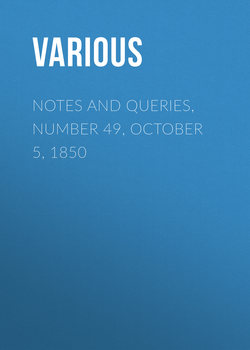Читать книгу Notes and Queries, Number 49, October 5, 1850 - Various - Страница 2
NOTES
SATIRICAL SONG UPON GEORGE VILLIERS, DUKE OF BUCKINGHAM
ОглавлениеIn turning over some old bundles of papers of the early part of the seventeenth century, I met with the following satirical effusion upon "James's infamous prime minister," George Villiers, Duke of Buckingham. As an echo of the popular feelings of the people at the time it was written, it merits preservation; and although I have seen other manuscript copies of the ballad, it has never yet, as far as I can learn, appeared in print.
It appears to be a parody or paraphrase of a well-known ballad of the period, the burden of which attracted the notice of the satirist. It afterwards became a common vehicle of derision during the civil war, as may be seen by turning over the pages of the collection entitled Rump Songs, and the folio volumes of the king's pamphlets.
The original of these parodies has hitherto eluded my researches. It is not among the Pepysian, Roxburghe, Wood, or Douce ballads, but perhaps some of your readers may be able to point it out in some public or private collection.
"Come heare, Lady Muses, and help mee to sing,
Come love mee where I lay;
Of a duke that deserves to be made a king—
The cleane contrary way,
O the cleane contrary way.
"Our Buckingham Duke is the man that I meane,
Come love mee where I lay;
On his shoulders the weale of the kingdome doth leane—
The cleane contrary way,
O the cleane contrary way.
"O happiest kingdome that ever was kind,
Come love mee where I lay;
And happie the king that hath such a friend—
The cleane contrary way,
O the cleane contrary way.
"Needs must I extoll his worth and his blood—
Come love mee where I lay;
And his sweet disposition soe milde and soe good—
The cleane contrary way,
O the cleane contrary way.
"Those innocent smiles that embelish his face,
Come love mee where I lay;
Who sees them not tokens of goodness and grace—
The cleane contrary way,
O the cleane contrary way.
"And what other scholler could ever arise,
Come love mee where I lay;
From a master that was soe sincere and wise—
The cleane contrary way,
O the cleane contrary way.
"Who is hee could now from his grave but ascend,
Come love mee where I lay;
Would surely the truth of his service commend—
The cleane contrary way,
O the cleane contrary way.
"The king understands how he honors his place,
Come love me where I lay;
Which is to his majestie noe little grace—
The cleane contrary way,
O the cleane contrary way.
"And therefore the government justly hath hee,
Come love mee where I lay;
Of horse for the land, and shipps for the sea—
The cleane contrary way,
O the cleane contrary way.
"What, though our fleet be our enemies debtor,
Come love mee where I lay;
Wee brav'd them once, and wee'l brave them better—
The cleane contrary way,
O the cleane contrary way.
"And should they land heere they should bee disjointed,
Come love mee where I lay;
And find both our horse and men bravely appointed—
The cleane contrary way,
O the cleane contrary way.
"Then let us sing all of this nobel duke's praise,
Come love mee where I lay;
And pray for the length of his life and his daies—
The cleane contrary way,
O the cleane contrary way.
"And when that death shall close up his eyes,
Come love mee where I lay;
God take him up into the skies—
The cleane contrary way,
O the cleane contrary way."
EDWARD F. RIMBAULT.
